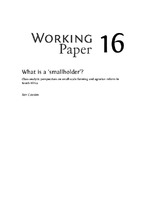| dc.contributor.author | Cousins, Ben | |
| dc.date.accessioned | 2019-03-11T09:42:31Z | |
| dc.date.available | 2019-03-11T09:42:31Z | |
| dc.date.issued | 2009 | |
| dc.identifier.citation | Cousins, B. (2009). ‘What is a ‘smallholder’? Class-analytic perspectives on small-scale farming and agrarian reform in South Africa’, Working Paper 16. PLAAS, UWC, Cape Town. | en_US |
| dc.identifier.uri | http://hdl.handle.net/10566/4468 | |
| dc.description.abstract | It is often argued that the primary beneficiaries of land reform in South Africa should be ‘the rural poor’ and ‘smallholders’, rather than ‘emerging commercial farmers’. The term ‘smallholder’ is problematic, however, because it tends to obscure inequalities and class- based differences within the large population of households engaged in agricultural production on a relatively small scale. Much usage suggests that smallholders form a relatively homogeneous group, and fails to distinguish between those producers for whom farming constitutes only a partial contribution to their social reproduction, those for whom it most of their social reproduction requirements, and those for whom farming produces a significant surplus, allowing profits to be reinvested and, for some, capital accumulation in agriculture to begin. This paper argue that a class-analytic perspective centred on the key concepts of ‘petty commodity production’ and ‘accumulation from below’ is essential for understanding the differentiated character and diverse trajectories of small-scale agriculture within capitalism. The paper explores the policy implications of such a class-analytic approach, and proposes that land and agrarian reform should aim to support a broadly- based process of ‘accumulation from below’, in combination with supporting supplementary food production on small plots and fields by large numbers of rural (and peri-urban) households, in order to enhance their food security and reduce income poverty. This in turn could see a marked increase in the numbers of (black) small-scale capitalist farmers. This class would be well placed to play the leading role in reconfiguring the dualistic and racialised agrarian structure inherited from the past, through being able to compete with large-scale commercial farmers in supplying both domestic and export markets. | en_US |
| dc.language.iso | en | en_US |
| dc.publisher | Institute for Poverty, Land and Agrarian Studies, University of the Western Cape | en_US |
| dc.relation.ispartofseries | Working Paper;16 | |
| dc.subject | Land reform | en_US |
| dc.subject | Smallholders | en_US |
| dc.subject | Petty commodity production | en_US |
| dc.subject | Agrarian reform | en_US |
| dc.title | What is a ‘smallholder’? Class-analytic perspectives on small-scale farming and agrarian reform in South Africa | en_US |
| dc.type | Working Paper | en_US |

